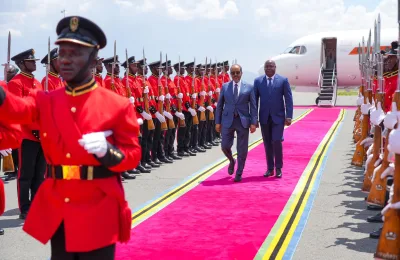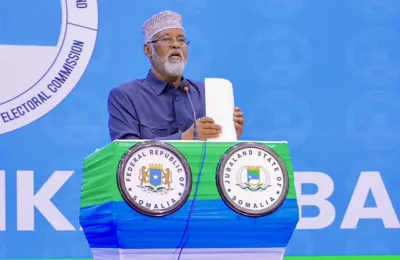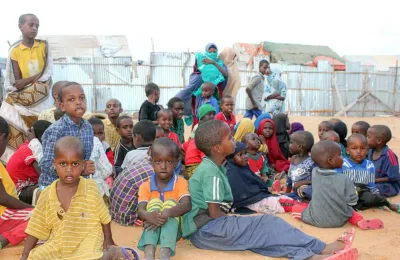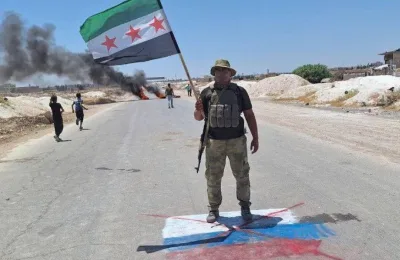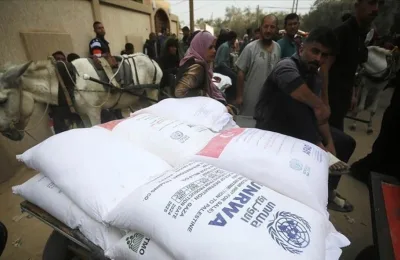Mogadishu, Somalia – President Hassan Sheikh Mohamud has no doubt about who is to blame for…

Mogadishu, Somalia – President Hassan Sheikh Mohamud has no doubt about who is to blame for the suffering from the latest drought to hit the Horn of Africa country.
“Al-Shabab have restricted the movement of goods and people so people are isolated and cannot receive aid or even the normal trade,” President Mohamud told Al Jazeera in an exclusive interview. “The routes are blocked. So that created [the conditions] for people to go hungry.
“But that is not going to stop us. The interior ministry today sent a food convoy to the Gedo and Bakool regions of the country – with a security escort. The issue of drought is a very serious one.”
However, as government and rebel fighters battle over territory and access routes, tonnes of food meant for the tens of thousands of starving people in southern Somalia remains locked in massive warehouses in Mogadishu, the Somali capital.
Drought effects easy to see
Far removed from government efforts and statements in the capital, amidst a bowl of swirling brown dust, Zahra Ali – once the proud owner of 35 goats – used all the energy left in her small frame to fetch water from an almost empty well.
Ali had walked for more than fifteen kilometres to get to this well, some twenty kilometres outside the border town of Dollow in Somalia’s Gedo province – near the border with Ethiopia.
Not far from this well, stark evidence of several missed rainy seasons was obvious. A weeks-old donkey carcass lied next to several dead goats and sheep. The last time a drop of rain fell on this part of southern Somalia was early October 2013. And three years ago, southern Somalia, like the rest of the country, was hit by the worst famine in more than sixty years. More than 260,000 people died in its wake.
“I used to own 35 goats. Now I only have ten. They died of thirst and there was nothing for them to eat,” Ali told Al Jazeera in a tired voice. “We may follow our dead animals if we do not get help,” she said, while covering her face with a piece cloth as protection from the dust.
“We should not be left to die like the animals. We only have days to live. Please help us,” she added.
Like Ali, thousands of people are on the move in Gedo, all trying to find water to drink and pastures for their barely-alive livestock. Carcasses littered the ground near what used to be watering holes. By the roadside, too, there were animal remains, half-covered in dust.
A trail of rising dust from vehicles driving on the sun-baked street attracted locals. Some emerged from sheds of twigs and dried grass, others waited patiently by the side of the road to try their luck with passing vehicles. They rushed to a government convoy that sped past without stopping. They threw their hands in the air and screamed for help, but luck was not on their side this time. They were left angry and dejected.
‘No one cares about us’
Hussein Abdi, a fifty-six-year-old man with two wives and thirteen children, was one of about forty people who had come to the road.
“We have not had a drop of rain since October last year. I am a nomad and my animals are all dead. Sometimes passing vehicles bring us some water. When there are no vehicles we walk for more than sixty kilometres to get water,” Abdi told Al Jazeera.
“No one cares about us. We are only waiting for Allah to help us,” he said.
Among those who came to stand by the roadside in the scorching equator sun in search of assistance were children as young as five and elderly people who were weak and barely able to stand without the support of a walking stick. Some had not had anything to eat for days.
Meanwhile, in there has been a spike of new arrivals in the major towns in southern Somalia. The town of Dollow has seen a marked increase. The already crowded refugee camp in the town is growing each day.
Muslima Ibrahim came from the village of Ufuroow and has been in the camp for a month.
“We came here because of hunger and thirst. No one has given us anything. We have not been registered yet,” she told Al Jazeera.
In the conflict- and drought-hit province of Bakool, a one-hour flight north of Gedo, the situation is more precarious than anywhere else in the country. People in Bakool are not just battling nature, but also man-made elements.
Huddur, the provincial headquarters and the region’s most populous town, hasn’t had a drop of rain for more than a year. In March this year, the al-Qaeda-linked rebel group, al-Shabab, withdrew from the town. Somali government troops backed by Ethiopian forces took over. The rebel group in their attempt to cut off supplies to the Somali and Ethiopian troops blockaded the town, preventing all goods from entering. Now the price of basic goods has more than tripled, forcing many people to either leave the town or fall further into hardship.
“We have had two years of drought and before that we had seven years of conflict in this province,” Bakool provincial commissioner, Mohamed Abdi Mohamed, told Al Jazeera.
“Lack of food and water is our biggest challenge now. Food is too expensive even for those with money. The town is under a blockade.”
As Somali government troops and African Union forces capture more towns from al-Shabab, an increasing number of towns are getting blockaded. At least four towns in southern Somalia have been cut off since the start of this year. Any humanitarian assistance to these towns will have to be airlifted – an expensive and complex operation that the weak Western-backed Somali government can’t afford.
At this point, the drought-stricken people of Gedo have long given up waiting for the international community, the Somali government or al-Shabab to come to their rescue.
“We have been waiting for months. Our situation is only getting worse. We are praying to Allah to provide us with rain. Only Allah can help us,” Ali, the goatherd, told Al Jazeera.
Follow Hamza Mohamed on Twitter: @Hamza_Africa


